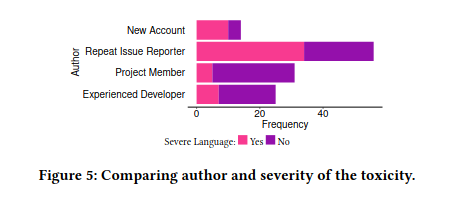Understanding toxicity in Open Source Discussions
This talk is based on the paper "Did you miss my comment or what: Understanding toxicity in Open Source Discussions" (https://cmustrudel.github.io/papers/osstoxicity22.pdf)
The aim of the talk is try to understand online toxicity in open source communities. The kinds, reasons and effects of toxicity across the internet are well documented, but toxicity specifically within OSS communities is not very well understood.
The authors have collected over 28 million posts (comments) made on Github within a seperate period and curated a sample of 100 "toxic" discussions. They then qualitatively analyzed the sample to gain an understanding of the characteristics of open-source toxicity.
Toxicity here is defined as “rude,disrespectful, or unreasonable language that is likely to make someone leave a discussion”. Toxicity is not new to open source. While the term has only started being used recently but such behaviours have existed for a long time.
The talk will cover the following aspects of the paper -
- (Types of) Toxicity observed (on Github)
- Triggers of toxicity
- Authors of toxicity
- After effects - Harms and Reactions
- Findings of the study (mentioned below)
If time permits I would also like to go in detail about the research methods used to triage "toxic discussions", indicators of toxicity, ethical considerations that go behind before calling something "toxic" etc.
Findings
- Open source toxicity is built different (in terms of nature of comments, open source discussions are vastly different from reddit, stackoverflow etc.
- Experienced != non toxic - Majority offenders are repeat/regular users/contributors

- Size of the project has close correlations with the amount of toxicity they receive
Here are some examples of some comments/discussions that I found amusing -
- a user of a GUI crypto wallet with a built-in crypto miner noticed the presence of the miner and interpreted it as malware (a misunderstanding, the presence, deactivated by default,was mentioned as an intentional feature in the readme). The user threw explicit curse words at the maintainers of the project and accused them of being “criminal crooks” for trying to “infect other computers with malware”
- A project member was unhappy with the colors of a project, reporting “colors are horrible for […], just look at this s**t” . Even after a contributor provided a link to the documentation, the user remained unsatisfied and unapologetic.
- A user was generally unhappy with a project and wrote “Worst. App. Ever. Please make it not the worst app ever. Thanks”, followed by a pull request that deleted all the code in the repo; after the main-tainer closed the issue, the user responded “Merge my PR damnit” and nothing else happened.
- For example, as one such user of a popular library puts it, “I just tried reinstalling your buggy, sh**ty software for the third time. Maybe you guys can get one that works right and stick to it without changing it all the time” .
- For example, a user wrote a hostile issue in a Microsoft project titled “WHY



 ” which simply said “Revenue. F**k you guys”
” which simply said “Revenue. F**k you guys”
- In one case, a user called out for violating the code of conduct responded insisting “I will neither change my language, nor my tone or style. Both, language and tone, are perfectly valid, given the circumstances. I will remain myself, and will repel this attack to my individuality”, referring to invoking the code of conduct as “CoC-Fascism,”
I also plan to reach out to Indian project maintainers for specific instances in Indian OSS projects.
There are not many resources I could find on how to effectively deal with OSS toxicity, but I will share some personal learnings on building inclusive communities, dealing with "trolls", drafting an effective code of conduct.
You can go through the complete paper here - https://cmustrudel.github.io/papers/osstoxicity22.pdf
A talk by the authors - https://www.youtube.com/watch?v=7sGqkyXX8GY
I've also written a brief summary of the paper here - https://forum.fossunited.org/t/papers-we-love-foss-edition/3150/5